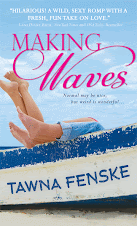Something weird happens every January.
I mean besides the fact that my bathroom scale malfunctions, because
clearly I didn't eat that many bacon-wrapped dates for Christmas.
Each January, I see a flood of emails, tweets, private Facebook messages, and the occasional note scrawled on the bathroom wall asking me for advice on getting published. "I've vowed to write a book this year!" they often begin, or even, "I've just finished my first novel!" And then comes the big ask: "You seem like you're doing well, so can you tell me how to get it published?"
The simple answer is
no.
I'm not saying that to be a bitch. There are plenty of other ways I elect to be a bitch on a daily basis, but I'm generally pretty kind when it comes to encouraging my fellow writers.
 |
I suck at giving publishing advice almost as much as I
suck at making a hairbrush look like a lightsaber instead
of like a dildo. You're welcome for that visual. |
But here's the thing: If you see an author who's published a dozen or so books in the last 5-10 years, odds are good that person would give you horrible advice on the process of getting published. In fact, the advice they give might end up discouraging, confusing, or completely misdirecting you. Why? Because the publishing industry has changed at the speed of a roadrunner careening down an Astroglide-coated Slip-and-Slide. The knowledge we operated with at the start of our careers is now so laughably antiquated, we might as well tell you your best path to publication is chiseling your manuscript into a cave wall.
I made my first attempt at writing fiction in 2002. Back then, most publishers and agents still wanted snail-mailed queries. It could take a year to hear back from them, and if you did, they might ask you to print out the whole manuscript and lug that 987-pound mofo down to the post office. We'd heard of self-publishing, but it was that thing you did if you couldn't get an agent or a "real" book deal. Twitter was the sound the aforementioned roadrunner might make if he fell off the Slip-and-Slide, and Google sounded like something dirty you might do to yourself under the covers (on second thought, it still sounds like that). Aspiring authors longed to see our books on the shelves at Borders, because
obviously everyone wants books in paperback and not those ridiculous newfangled eReader thingies.
You see where I'm going with this? None of that is true anymore, and as far as most of it's concerned, good riddance to bad rubbish.
But if you look at authors who've been cranking out books for a few years, odds are good that was their starting point. And after they slowly, painstakingly crawled their way out of the slush pile and worked their way toward royalty checks that allow them to buy both the cup of coffee
and the donut, they crammed their brains full of new knowledge applicable to a different stage in their careers. Contract negotiations, social media marketing, branding, how to be a hybrid author, how to convince the IRS a sex toy collection is a write-off – these are the things we learn after we've been at it a while and reached some modicum of success. While it's useful knowledge after you have a few published books under your belt, you'll make yourself batshit crazy if you start fretting about those things when you're standing there with that shiny first novel in your hand and stars in your eyes.
Any advice I could give you on how to get a book published is either woefully outdated or completely useless to you unless you're at a point in your career where your agent can sell your next book based on the letters "TBD" (yes, that really happened, and yes, I'm eternally grateful
Wolfson Literary pulled off that feat and then didn't bat an eyelash when I said, "I think this will be a romantic comedy about death and grief," though I suspect we both breathed a sigh of relief when my editor approved and the book continued on its publication journey for release September 2016. But that's a story for another time. Also, if I'd attempted something like that ten years ago, I would have been laughed out of the publishing biz quicker than you can say, "gofuckyourself, newbie.")
So what
can I give you? I mean besides a pat on the butt and hearty congratulations on a major milestone. Seriously, completing that first novel is HUGE. Like go-ahead-and-drink-the-whole-bottle-of-Chianti huge.
Well, I can steer you to the
FAQ page of my website, where you'll find a few links and tidbits of advice that may or may not be helpful. I can tell you that while there are wildly differing views on whether authors do or do not need an agent, I would sooner hack off my own nipples with a rusty spoon than operate without Wolfson Literary in my corner, and if you think you might also need an agent,
agentquery.com is a good place to start. If the idea of writing a query in the first place is kinda daunting, visit
Query Shark and start reading. Don't pause for food or potty breaks until you've been at it for at least eight hours (and preferably eight days).
Don't get discouraged. It's rough out there, and sometimes searching too hard for the magic secret to publication will suck all the joy out of your writing process.
Above all, keep writing. Let me repeat that: KEEP WRITING. It's the one thing you can do to guarantee you'll continue to improve your skills as an author and your odds of eventually landing that book deal.
But don't listen to me. I'm still back here setting up that Slip-and-Slide. Anyone know where I can find a roadrunner?



































